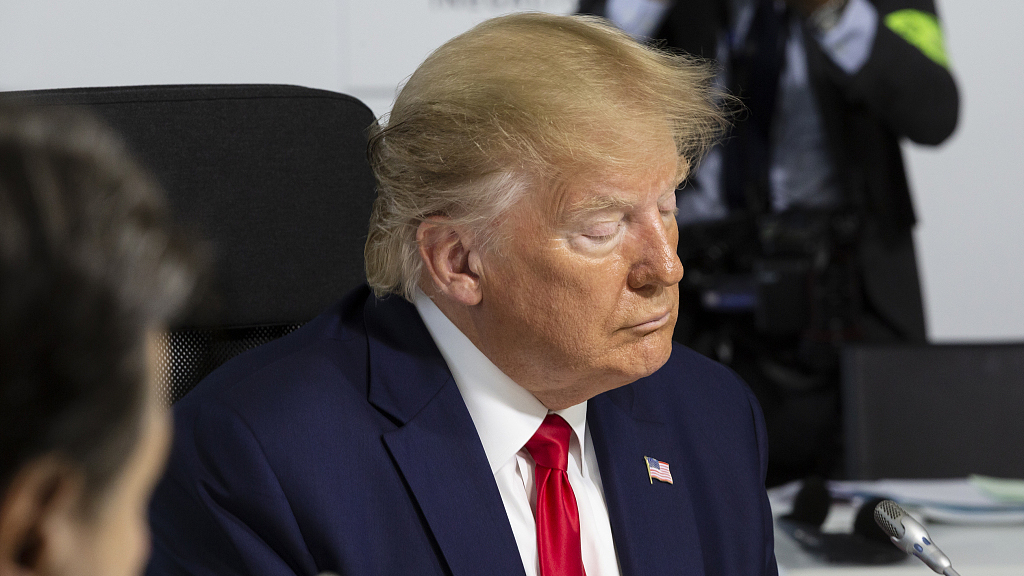

President Donald Trump has returned from a contentious G7 summit with more challenges than when he departed. There’s the U.S.-China trade war that shows no immediate signs of easing. And as Iran's president saying talks with Washington are off the table, tensions are high with Tehran. All these are casting a shadow on the 2020 U.S. presidential election.
Nathan King, CGTN White House Correspondent, said Iranian Foreign Minister Javad Zarif’s visit to the G7 summit was a diplomatic overture by Emmanuel Macron. Although Trump said he was fully informed every step of the way about Javad Zarif coming to the G7, it was a way of trying to break an impossible deadlock. Because there’s a maximum pressure campaign from Washington while there are also European, Chinese and Russian commitments to the Joint Comprehensive Plan of Action (JCPOA), the Iran nuclear deal and wills to deliver economic terms to Iran that was agreed. But the secondary sanctions by the U.S. basically block the sale of Iranian oil, which makes it very difficult. The way in France was one of the most Hawkish signatories of the Iran nuclear deal, so they can play good officer in between Washington and Tehran, but it failed to gain momentum.
Hamza Khan, Democratic Strategist, the founder of the Pluralism Project, thinks the fact that Iranian Foreign Minister Javad Zarif was invited to the G7 meeting doesn't speak ill of the relationship between the U.S. and its allies across the world, but it does speak about the level to which American allies' leadership do not trust Donald Trump to execute American foreign policy in the best interest of both the United States and its outstanding treaty obligations across the world.
So if anything, having a Foreign Minister Zarif in G7 sent the message indicating they're working with Iran regardless of Trump's engaging or not. It's also a way of showing the rest of the world that Iran can be brought into the fold whereas the United States is continuing to isolate itself with Trump's rhetoric. It’s clear that Iran, on the other hand, can be brought in.
Aside from the international uncertainties, the current status of 2020 U.S. presidential election for President Trump is also getting more obscure as no positive signs are shown in the escalating trade war and Trump's competitors are showing advantages.
David Skidmore, professor of political science at Drake University, said Iowa farmers have been patiently waiting for some resolution and they feel like Charlie Brown with Lucy pulling away the football, because a number of times there have been indications from the White House that a deal was coming, and all of a sudden the talks break down. The rural areas of Iowa must take a deep breath.
It takes a lot for the farmers to lose faith in a Republican president, but with the latest escalation, farmers are hurting not just from the loss in exports in the enormous soybean market for the world's most populous country, but also the spring flooding and the president's policies on ethanol. So patience is rapidly running out.
Van Mobley, professor of history and economics at Concordia University, doesn't agree with the Skidmore's assessment that Trump is losing farmers' support. He thinks the farmers will stick with Trump and they also know that the United States–Mexico–Canada Agreement opens up large markets, for example, for dairy in Canada. Mobley also mentions a new deal with Japan announced at the G7 that Japan will be buying a large amount of American agricultural products. According to Mobley, Trump is working hard supporting the farmers when necessary. Mobley thinks there are a lot of factors that cause commodities to fluctuate on the global market, which the farmers are well aware of as all of this could change rapidly.
(If you want to contribute and have specific expertise, please contact us at opinions@cgtn.com.)

Copyright © 2018 CGTN. Beijing ICP prepared NO.16065310-3
Copyright © 2018 CGTN. Beijing ICP prepared NO.16065310-3